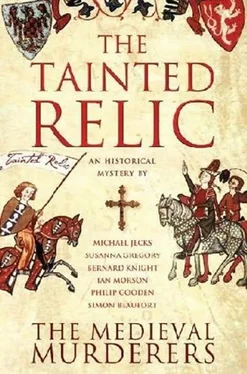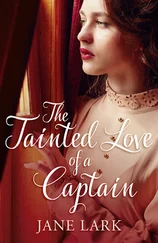The room was stifling, so he rose to open the window. After he had lain down again, he found he was too hot in shirt and leggings, so stood to remove them. By the time he was comfortable, the Franciscans in the room opposite had embarked on a noisy debate, and their strident voices roused him from the edge of a doze. He climbed to his feet a third time, to close the window. But the friars’ discussion was an intense one, and their clamour carried on the still night air. They were just loud enough for him to make out some of the words, so he knew they were arguing about the Holy Blood and its place in the mass. He returned to his bed but found himself straining to catch what they were saying, so pulled the blanket over his head to block out the sound. But the hot night made many scholars restless. There was a constant procession across the yard for drinks or visits to the latrines, and someone was playing a lute. Bartholomew slept fitfully, and by the morning he felt wearier than when he had retired.
He joined his colleagues in the yard as they assembled to process to the church, breathing in deeply the slightly cooler air that whispered in from the east. After the mass, he remembered that it was Saturday, and that he had arranged for his students to study with another master, which meant he was free. Normally he used any spare time to write the treatise on fevers that took most of his free hours, but he could not settle to it that day. He was not sure whether the problem was the heat or the odd business surrounding the relic.
Since there was no point in staring at blank parchment all morning, waiting for inspiration, he went in search of Michael, who was enjoying an illicit second breakfast in the kitchens. The monk waved to a stool, inviting the physician to join him in a small repast comprising oatcakes smeared in white grease and heavily sprinkled with salt. Bartholomew declined, knowing they would only make him thirsty. The monk had just started to outline again some of the facts they had uncovered about the deaths of Andrew and Witney when there was a tap on the door and one of his beadles sidled into the room.
‘You are needed, Brother,’ he said, eyeing the oatcakes longingly. ‘You too, Doctor.’
‘Is it Prior Lincolne of the Carmelites?’ asked Bartholomew. ‘I thought his fever was over.’
‘It is Urban, the novice. Hurry, though. I am no physician, but I can tell he does not have long for this world.’
‘Where?’ demanded Michael, making for the door.
‘St Andrew’s Church,’ replied the beadle, standing aside to let the senior proctor go first, so he could steal an oatcake before he followed.
Bartholomew and Michael hurried along the streets in the early morning light. Carts and people were already out, indicating that few were sleeping long when the heat was so intense. Even before the sun had fully risen, the town was sticky and humid, and Bartholomew felt himself become breathless as he walked, as though there were not enough air to go around. Michael panted next to him, complaining vociferously about the wretched furnace of a sun.
Urban had been stricken in the churchyard, and he lay in the long grass near the porch. Both scholars stopped dead when they saw they were not the first to arrive: Tomas was there, kneeling next to the novice and giving him last rites. Bartholomew was aware of Michael’s tense anger, but he could hardly object to a friar’s prayers for a dying soul, and so was obliged to hold his tongue until the ritual was finished. It was some time before Tomas packed away the chrism and the stole he wore around his neck; the Dominican took his duties seriously.
‘What happened?’ asked Michael in a whisper to Bartholomew while they waited. ‘Can you see?’
‘It looks as though Urban has fallen on top of something,’ replied Bartholomew. ‘I can see a spike protruding from his stomach, and he is lying awkwardly.’
‘Fell or was pushed?’ asked Michael.
Bartholomew shrugged. ‘It is impossible to say-not from this distance and without having inspected the wound, and probably not even then. You will have to ask him. Tomas has finished now.’
Bartholomew dropped to his knees, assessing the young man’s injury, but making no attempt to touch it. As he had surmised, Urban had toppled on to a metal spike that had pierced him clean through. It was an ugly wound, but Urban did not seem to be in pain, although his hands were stained red with his own blood. Bartholomew suspected it had damaged his spine and deprived him of feeling. There was nothing he could do to save him, and there was no point in moving him when it would only cause him discomfort in his last few moments.
While Michael spoke gently, identifying himself and telling Urban what he needed to know, Bartholomew studied the object that had killed the lad. At first, he saw only that it was an unusual shape and seemed to be attached to the ground. Eventually, he realized that it was the shoe-scraper that stood outside many churches, so parishioners could remove the worst of the muck from their feet before entering. Urban had dropped, fallen or been pushed on top of one that was particularly ornate, and it had speared him like a fish.
‘Dr Bartholomew is here,’ said Michael softly, when the lad’s eyes seemed to focus on him at last. ‘Do you want anything to ease the pain?’
‘There is no pain,’ whispered Urban. ‘Only cold.’
Bartholomew removed his tabard and laid it over him, although he doubted it would make much difference. Without a moment’s hesitation, Tomas hauled off his habit and wrapped it around the lad’s legs, revealing a light shift that was unusually clean for a garment that was probably never seen by anyone else.
‘Did Andrew take any medicines?’ asked Bartholomew. ‘Perhaps something for the ache in his back-his old wound?’
‘Poppy syrup-but only when it became very bad,’ replied Urban. He gave a sudden, heart-broken sob. ‘I cannot believe he so suddenly decided he would not complete his journey. I would have helped him, no matter what the cost. I lied for him, too. Seton was not in St Bernard’s Hostel when Witney died. We said he was with the body when we found it, because we knew he was going to accuse us of the crime, and it was the only way to make sure you knew we were innocent.’
‘Never mind that,’ said Michael softly. ‘Did someone push you on to that spike? Tell me his name.’
Urban shook his head. ‘No one pushed me. I am dying because of Barzak’s curse. I touched the relic, you see.’
‘I thought you hesitated,’ said Bartholomew, not sure he wanted to hear about another death for which the relic was deemed responsible. ‘And that Andrew had second thoughts about your-’
Michael silenced him with a glare. ‘We believe your master may have been murdered,’ he said, as gently as such grim news could be imparted. ‘It is possible that the man to whom he gave the relic was also the villain who killed him. As far as I am concerned, this releases you from your promise to Andrew. You are dying, but I will avenge you and him if you tell me this fellow’s name.’
‘Thomas,’ said Urban in a whisper. Bartholomew could tell by the glazed look in his eyes that he could no longer see Michael.
‘Thomas?’ asked Michael, looking up at the friar, who appeared to be astonished by the claim.
‘Andrew took it to the Dominican priory, and gave it to Kip Roughe with orders that he was to pass it to Thomas,’ breathed Urban. ‘He put it in a box, so Roughe would not touch it and become a victim of Barzak’s curse, too. He was careful. I touched it, though, when Roughe gave it to the wrong Thomas.’
‘What do you mean?’ pressed Michael, confused by the disjointed explanation.
Urban swallowed. ‘Andrew told me he had arranged for the relic to go to his old student, but it was clear that had not happened yesterday: Tomas did not have it. I was jealous at first, but then I came to my senses-if that was what Andrew wanted, then it was my duty to see his wishes fulfilled. I asked Roughe about the box, and I realized why it was not in Tomas’s possession.’
Читать дальше












